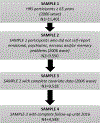Insomnia as a predictor of diagnosed memory problems: 2006-2016 Health and Retirement Study
- PMID: 33601227
- PMCID: PMC11000697
- DOI: 10.1016/j.sleep.2021.01.038
Insomnia as a predictor of diagnosed memory problems: 2006-2016 Health and Retirement Study
Abstract
Objective: To evaluate the longitudinal relationship in insomnia symptoms over time with incident memory problems and dementia diagnoses among U.S. adults aged 65 years and older.
Methods: Secondary analyses were performed on 9518 elderly participants (≥65 years) who completed the 2006 wave of the Health and Retirement Study (HRS) and were followed-up to determine if insomnia symptom scores (2006-2014) were associated with time-to-onset of [1] physician-diagnosed "memory-related disease", "Alzheimer's disease" and/or "dementia, senility or any other serious memory impairment" and [2] diagnosis of dementia based on HRS-specific criteria. Cox proportional hazards models were constructed adjusting for socio-demographic, lifestyle, and health characteristics.
Results: In fully adjusted models, severe insomnia symptoms were associated with increased risk of physician-diagnosed memory problems. Individuals reporting any change (increase or decrease) in insomnia symptoms during the 2006-2010 period were more likely to be diagnosed with dementia based on HRS criteria. Finally, those who experienced an increase in the severity of insomnia symptoms over time exhibited 41-72% increased risks of physician-diagnosed memory problems and 45-58% increased risks of dementia diagnosis based on HRS criteria.
Conclusions: When severe insomnia symptoms increased over time, physician-diagnosed memory problems and dementia diagnoses also increased among U.S. elderly people over a 10-year follow-up period. More studies are required to confirm these findings using large prospective cohort designs and validated tools.
Keywords: Aging; Alzheimer's disease; Dementia; Insomnia; Neurodegenerative; Sleep.
Copyright © 2021 Elsevier B.V. All rights reserved.
Conflict of interest statement
Declarations of interest: none.
Figures
Similar articles
-
Time-Varying Insomnia Symptoms and Incidence of Cognitive Impairment and Dementia among Older US Adults.Int J Environ Res Public Health. 2021 Jan 5;18(1):351. doi: 10.3390/ijerph18010351. Int J Environ Res Public Health. 2021. PMID: 33466468 Free PMC article.
-
Insomnia symptom subtypes and manifestations of prodromal neurodegeneration: a population-based study in the Canadian Longitudinal Study on Aging.J Clin Sleep Med. 2022 Feb 1;18(2):345-359. doi: 10.5664/jcsm.9562. J Clin Sleep Med. 2022. PMID: 34314348 Free PMC article.
-
The role of depression in the insomnia of people with subjective memory impairment, mild cognitive impairment, and dementia in a community sample of elderly individuals in South Korea.Int Psychogeriatr. 2017 Apr;29(4):653-661. doi: 10.1017/S1041610216002076. Epub 2016 Dec 6. Int Psychogeriatr. 2017. PMID: 27921991
-
Dementia -- Caring, Ethics, Ethnical and Economical Aspects: A Systematic Review [Internet].Stockholm: Swedish Council on Health Technology Assessment (SBU); 2008 Jun. SBU Assessment No. 172. Stockholm: Swedish Council on Health Technology Assessment (SBU); 2008 Jun. SBU Assessment No. 172. PMID: 28876770 Free Books & Documents. Review.
-
The effect of insomnia on development of Alzheimer's disease.J Neuroinflammation. 2020 Oct 6;17(1):289. doi: 10.1186/s12974-020-01960-9. J Neuroinflammation. 2020. PMID: 33023629 Free PMC article. Review.
Cited by
-
Predictors of Covid-19 level of concern among older adults from the health and retirement study.Sci Rep. 2022 Mar 15;12(1):4396. doi: 10.1038/s41598-022-08332-8. Sci Rep. 2022. PMID: 35292672 Free PMC article.
-
Serum levels of neurotensin, pannexin-1, and sestrin-2 and the correlations with sleep quality or/and cognitive function in the patients with chronic insomnia disorder.Front Psychiatry. 2024 May 13;15:1360305. doi: 10.3389/fpsyt.2024.1360305. eCollection 2024. Front Psychiatry. 2024. PMID: 38803679 Free PMC article.
-
Poor sleep quality, dementia status and their association with all-cause mortality among older US adults.Aging (Albany NY). 2024 Sep 4;16(17):12138-12167. doi: 10.18632/aging.206102. Epub 2024 Sep 4. Aging (Albany NY). 2024. PMID: 39237306 Free PMC article.
-
The Bidirectional Link Between Sleep Disturbances and Traumatic Brain Injury Symptoms: A Role for Glymphatic Dysfunction?Biol Psychiatry. 2022 Mar 1;91(5):478-487. doi: 10.1016/j.biopsych.2021.06.025. Epub 2021 Jul 14. Biol Psychiatry. 2022. PMID: 34481662 Free PMC article. Review.
-
Association between longitudinal trajectories of insomnia symptoms and subsequent cognitive decline: a prospective cohort study.Age Ageing. 2025 Jul 1;54(7):afaf186. doi: 10.1093/ageing/afaf186. Age Ageing. 2025. PMID: 40613668 Free PMC article.
References
-
- Wang F, Chow IHI, Li L, et al. Sleep duration and patterns in Chinese patients with diabetes: A meta-analysis of comparative studies and epidemiological surveys. Perspectives in psychiatric care 2019;55:344–353. - PubMed
-
- Yan B, Zhao B, Fan Y, et al. The association between sleep efficiency and diabetes mellitus in community-dwelling individuals with or without sleep-disordered breathing. Journal of diabetes 2020;12:215–223. - PubMed
-
- Kuehn BM. Sleep Duration Linked to Cardiovascular Disease. Circulation 2019;139:2483–2484. - PubMed
-
- Ludka O Sleep apnea and cardiovascular disease. Casopis lekaru ceskych 2019;158:178–184. - PubMed
Publication types
MeSH terms
Grants and funding
LinkOut - more resources
Full Text Sources
Other Literature Sources
Medical


